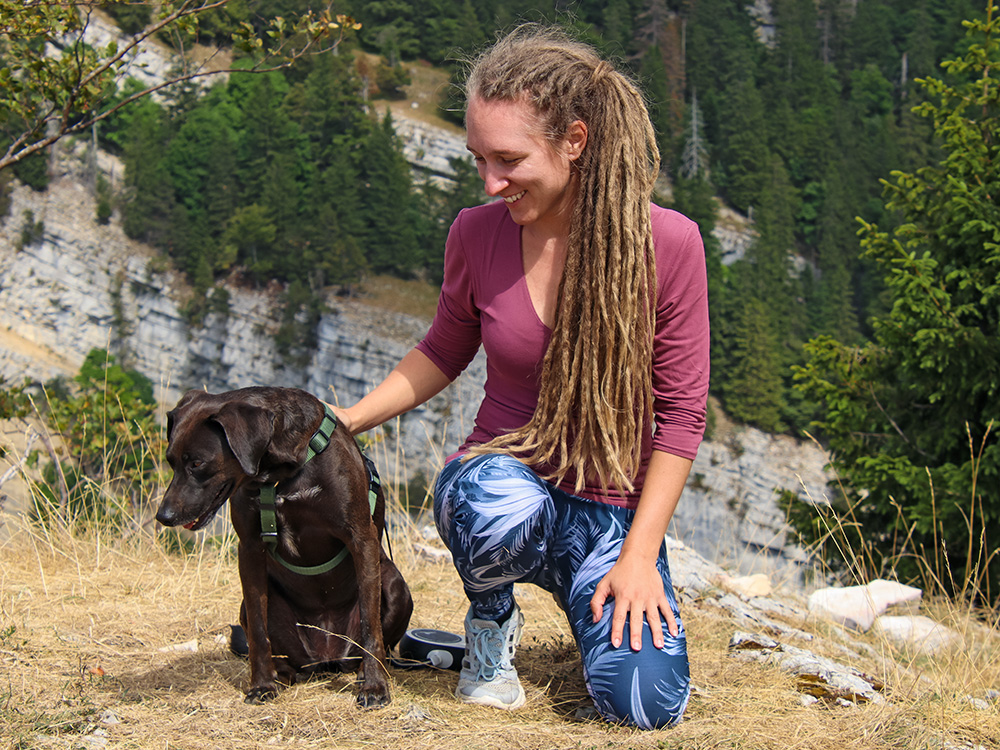Education rather than blind activism.
Interview: Davina Benkert
Bettina Huber advocates for a world without the exploitation of animals. Her aim is, among other things, to foster greater awareness of how the state influences food production in Switzerland.
ALUMNIBASEL: What inspired you to read philosophy and Spanish studies and then do a doctorate in philosophy?
BETTINA HUBER: I’ve always enjoyed analyzing concepts and systematically grappling with a variety of issues – hence the decision to study philosophy. In high school, I spent an exchange year in Ecuador, and that awakened my interest in the Spanish language. I then came to the University of Basel for my master’s because I was interested in the research focus at the Department of Philosophy. After my master’s I wanted to study philosophy in more depth and wrote my dissertation on the dignity of non-human animals. “Dignity” is used differently in many different contexts. In my research, I approached the concept analytically. I felt it was important to bring structure to it and to define it precisely.
AB: How did you end up in the communications sector?
BH: During my studies, a colleague told me about a vacancy at AlumniBasel. Working in the small team allowed me to take on many different roles, mainly in communication. This was my first opportunity to gain valuable professional experience. I have long been concerned by how we treat animals as a society. So I wanted my future career to combine the fields of communication, animal welfare and ethics. Not an easy undertaking. I was lucky to secure a job with Swissveg right away.
AB: What does your day-to-day work involve?
BH: I design and implement campaigns and projects on the topics of animal welfare, the environment and health. I’m also responsible for Swissveg’s media work. Increasingly, I find myself dealing with the field of politics. As part of the “Veggieday” project, I advise institutions and companies that want to expand the vegetarian and vegan offerings in their cafeterias, and so help protect the climate.
AB: What do you like about your work in particular?
BH: I like combining my experience in communications with the project-based approach from my dissertation: I devise campaign ideas that we then develop and implement as a team. I particularly enjoy this strategic and conceptual work. Summer was the start of the first campaign that I oversaw from start to finish.
AB: What’s the focus of this campaign?
BH: It’s about Switzerland’s political contradictions in the arena of animal welfare, health and the environment. For example, the Federal Food Safety and Veterinary Office has established that people in Switzerland consume more than three times the amount of meat recommended for a healthy diet. Despite this, the Federal Office for Agriculture pays significant contributions to Proviande, the Swiss meat industry association, and some of this money is used to promote sales. If meeting climate targets is a top priority, then the state should stop promoting a diet that’s harmful to the environment. We’ve launched a petition to resolve this contradiction.
AB: What motivates you personally to do this work?
BH: Sometimes, looking at the climate crisis and the way we treat animals, I start to lose hope. What helps me is working with motivated people every day to solve the problem. We can all make a difference. I want to raise awareness among the people of Switzerland. I want people to be able to make fact-based decisions. It’s also important that my work aligns with my values.
AB: What do you consider to be most important in life?
BH: I want to be connected: With my colleagues while exchanging ideas at work, with the world by advocating for animals and our environment, with my friends and family in my free time, when I engage with the animal kingdom and natural world. I spend a lot of time outdoors with my dog Csikita and try to observe and consciously appreciate my surroundings and the creatures within them. I like to capture these impressions in photographs. For me, being connected also means connecting with myself, whether I’m hiking or trying out new vegan desserts in my kitchen.
More articles in the current issue of UNI NOVA.

